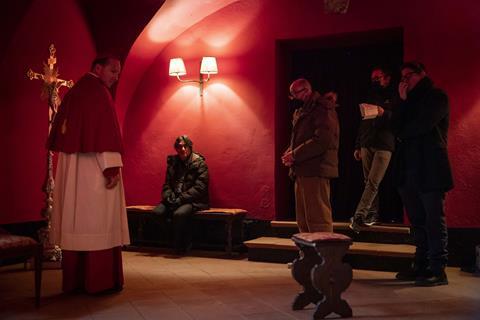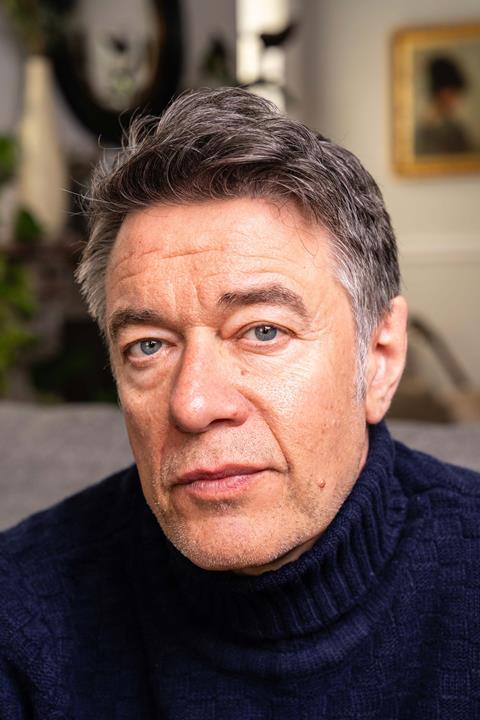The king of the book adaptation talks about finding his own story through others.

Peter Straughan was not expecting the success he has been enjoying with Conclave. The Newcastle-born writer was genuinely gobsmacked when his adaptation of Robert Harris’s episcopal thriller won the Golden Globe for screenplay.
“You could probably tell by the stupid expression on my face,” he laughs, when speaking to Screen International a week after the ceremony. “I suspected it was going to be quite a small film that would slip under the radar. So I’ve been amazed and delighted by how audiences have embraced it, and I genuinely don’t know why.”
He perhaps should not be so mystified by the favourable reception since Conclave’s Telluride premiere, with the film grossing more than $78m worldwide at press time since its release by Focus Features in North America in late October and emerging as an awards season frontrunner (Straughan’s nominations in the adapted screenplay categories are among the film’s eight Oscar and 12 Bafta nods). Conclave plays to his strengths, with its deft presentation of the power struggles and moral tensions during an unexpected papal election overseen by Ralph Fiennes’ faith-tested Cardinal Lawrence.
Like Straughan’s screen takes on John le Carré’s Tinker Tailor Soldier Spy and Hilary Mantel’s Wolf Hall (including its recent conclusion The Mirror And The Light), Conclave teases compelling drama from the often-subtle conflicts between powerful men in claustrophobically enclosed environments – in this case, the clandestine College of Cardinals. It is easy to see why he connected with Harris’s 2016 novel when executive producer Robyn Slovo (with whom he worked on Tinker Tailor) and House Productions’ Tessa Ross (who produced 2014’s Frank, another Straughan script) approached him in 2016 as soon as they had optioned the book. But there was also a personal aspect to its appeal.
“The world is familiar and, in a way, is home to me,” says Straughan, who was raised as a Catholic. “When I think about Catholicism, I think about my mother rather than authoritarian figures, so there’s a kind of nostalgia and warmth and a love for the Catholic world there. But also, maybe because I was brought up in quite a devout Catholic family, stories that are about moral tests and stark moral choices draw me as well.”
The moment he knew he had to adapt the book came when the character on whom Cardinal Lawrence is based – Italian in the original – delivers a homily in which he declares, “Let us pray that God will grant us a pope who doubts.” Straughan loved that idea.
“It felt quietly subversive and radical. This was during Trump’s first term, and that’s an interesting dance with Conclave, between it being universally about politics and at other times feeling like it’s particularly relevant to our world. I was seeing the world become so polarised, with so much hate because of people thinking they were right and the opposition were wrong and evil. So I embraced that homily, that certainty is the enemy of our collective safety.”

Another theme the film explores is one that comes up in most of Straughan’s work: that of loyalty and betrayal. “You’re absolutely right,” he says, citing its prevalence in adaptations as diverse as Wolf Hall, Conclave and 2009 satirical comedy The Men Who Stare At Goats (based on Jon Ronson’s book) – “three different books by different writers. This is the interesting thing about adaptation – you find your own story within someone else’s story, a thread that you bring to the surface.”
Straughan is not sure why he is so drawn to this theme, but suspects it must be down to his Catholic upbringing. “I have a vivid memory of being 11, by myself in the back garden at Easter, acting out the Passion of Christ against the clothes horse,” he says. “And, you know, the Judas story is so integral to that.”
In adapting Conclave, Straughan’s principal change is recalibrating Harris’s Cardinal Lomeli as Fiennes’s Lawrence. “There aren’t many English cardinals, it’s true,” he admits, “but there are some, and it would have been problematic to have a third or more of the screenplay in Italian.”
He praises Harris for being an ideal collaborator. “The best authors I’ve worked with have been the most relaxed and the least protective of the novel. Le Carré was incredibly open and collaborative, and Robert was the same. All you want to hear is for the author to say, ‘I’m here if you need me, and if you want me to stay away, that’s fine as well.’”
And even though Edward Berger – then yet to complete his Oscar-winning All Quiet On The Western Front – did not come on board as director until after the first draft had been completed, there was no “battle in the evolution of the script”, says Straughan, almost apologetically. “Because the book really works, the first draft was 80% of the work done.”
Set visits
Interestingly for Straughan, the remaining 20% involved Berger inviting him on set. Not just for a few days, as was normal in his previous experience, but for the majority of the Cinecitta-based shoot.
“I was beside Edward all the way,” says Straughan. “It was fantastic to watch him work, and great to work a little bit with the actors. A lot of directors would have a heart attack at the screenwriter going over and talking to the actors, but Edward actively encouraged it.”
Given his roots are in theatre (after giving up on playing bass for a rock band) and he has directed short films, including 2014’s Nosferatu In Love for Playhouse Presents, has Straughan’s experience with Berger encouraged him to direct a feature himself?
“I kicked the idea around when I did Nosferatu In Love,” he says, and mentions a one-time intention to direct his own adaptation of Ned Beauman’s 2012 novel The Teleportation Accident, which he describes as “surreal and slightly Coen-esque”. It is still “a possibility”, says Straughan, “but my hunch is if it was in me, I’d have done it by now.”
The attention he is currently receiving with Conclave and Wolf Hall: The Mirror And The Light may well rekindle that possibility, though there are plenty of other projects to keep him occupied. Straughan reveals he has met with a couple of directors he admires – Pawel Pawlikowski and Thomas Vinterberg – about potential collaborations, and also has a few prestige TV projects in the works: both, unsurprisingly, book adaptations.
Dave Hutchinson’s Fractured Europe spy-fi series is the source for Europa, a reunion for Straughan with Tinker Tailor director Tomas Alfredson, which the writer describes as “Tinker Tailor meets William Gibson”; and he is also working on a German-language show for Apple TV+ that adapts Philip Kerr’s popular Berlin Noir books, featuring Nazi-era private detective Bernie Gunther.
However, Straughan is taking nothing for granted in terms of his future fortunes. He is well aware that present success does not guarantee further triumph. After all, his big breakthrough with Tinker Tailor Soldier Spy in 2011 – co-written with his wife Bridget O’Connor, who died from breast cancer before the film was released – was followed by a number of relative disappointments including The Snowman and The Goldfinch, based on the wildly popular Jo Nesbo and Donna Tartt novels respectively. In this sense, Conclave marks a comeback.
“I look back on the last decade and there is a temptation perhaps to put a narrative on it,” he reflects. “To a certain extent, I think I lost my way after Bridget died. I struggled, and I made bad choices and didn’t do good work, and I feel like it’s taken a while to dig my way back out of that. But I’m aware that might just be a narrative and that, you know, sometimes films just don’t work anyway. You don’t have control.
“The truth is, there’s a million ways for a film to go wrong, and there’s only one or two ways for it to go right. So when you see the truly great films, they are like miracles.”

























No comments yet